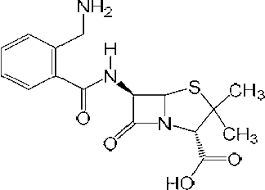Table of Contents
What is Ampicillin?
Ampicillin is a prescription penicillin-type antibiotic used for treating infections caused by micro-organisms as well as pneumonia and gonorrhea. The drug also treats infections of the abdomen, intestine , respiration infections, urinary infections, meningitis, and endocarditis. (Drugs.com)
Ampicillin dose for Endocarditis:
Adults: parenteral ampicillin (intramuscular [IM] or blood vessel [IV]) as one 2g dose administered thirty minutes to one hour before the technique.
Youngsters: parenteral ampicillin (IM or IV) as one 50 mg dose administered thirty minutes to one hour before the process.
If an indefinite quantity is not administered before the technique, the dose should be determined for up to two hours after the technique. Post-procedural dosing should most effectively reflect in patients who miss the pre-procedural dosage. (Micromedex)
When is Ampicillin prescribed?
Ampicillin is prescribed to stop the bacteria from multiplying unexpectedly, by preventing them from forming the cell walls that surround them. The cell walls are required to safeguard the bacteria from their surroundings, and to keep up the contents of the microorganism cell together.
Ampicillin is mainly prescribed, to stop the bacteria from forming the plasma membrane, as it cannot continue to exist without it. Ampicillin is effective towards an expansion of bacteria. (omudhome)
How can this medicinal drug be used?
Ampicillin is administered in the form of a tablet and as a suspension, liquid to be ingested. It must be taken regularly, about 3 to 4 times a day, either half an hour before or two hours after a meal. The length of the remedy relies upon the kind of infection that occurred.
Ampicillin is to be taken at the appropriate time each day. The instructions on the prescription label should be followed carefully, the physician or pharmacist ought to explain all directions and precautions carefully.
The drug has to be taken until the course is completed, even if the symptoms are better. The medication ought to not be stopped too soon and doses should not be skipped as the contamination may not be completely dealt with and the micro-organism might end up resistant to the antibiotics. (MedlinePlus)
Precautions to be taken before taking Ampicillin:
The clinical health practitioner and pharmacist ought to be knowledgeable in case of any allergies to ampicillin; cephalosporin antibiotics or any of the elements in ampicillin capsules or suspension and inform you of it. (MedlinePlus)
What should be done if a dose is skipped?
As quickly as you remember, take the neglected dose. But, if it is nearly time for the next dose, then the neglected dose should be skipped and the following dose needs to be taken as prescribed. The doses must by no means be doubled. (MedlinePlus)
What aspect outcome can this medicinal drug cause? (MedlinePlus)
Ampicillin can cause diverse effects such as
- Diarrhea
- Nausea
- Vomiting
Side effects in case of an allergic reaction to Ampicillin:
- Rash
- Itching
- Hives
- Cellular respiration or swallowing
- Wheezing
- Extreme diarrhea (watery or bloody stools), which can also occur with or without fever and stomach cramps and may arise up to two months after the medication.
- Fever, cough, infected throat, chills, and other signs and of infection could occur. (MedlinePlus)

(STRUCTURAL FORMULA OF AMPICILLIN)
Dosage forms & Strengths of ampicillin: (Micromedex)
Pills:
- 250 mg
- 500 mg
Oral suspension:
- 125 mg/5ml
- 250 mg/5ml
Powder for injection:
- 125 mg
- 250 mg
- 500 mg
- 1g
- 2g
- 10g
Favored dosing guidelines for Ampicillin:
Dosing recommendations for adults:
- Orally: 250-500 mg every 6 hours
- Intravenously/intramuscularly: 1-2 g every 4 to 6 hours or 50-250 mg per day divided every 4-6 hours, and should not exceed 12g per day. (Micromedex)
How can Meningitis be averted?
Bacteria referred to as Neisseria meningitides can cause Meningitis. 1 out of 10 humans carries this ailment in their nostrils or throat unknowingly. These are known as carriers. It’s a serious situation that can bring about mind damage or sometimes even death. (Kiefer)
Activities that can infect others through carriers are:
- Open-mouthed kissing
- Sharing meals or utensils
- Coughing
- Sneezing
With the advent of the modern-day vaccines, averting a meningitis infection can be a lot less difficult in recent times. Most children acquire the meningococcal conjugate vaccine routinely. The primary dose is given between the ages of 11 and 12 years. A booster shot is given five years later.
An older vaccine referred to as the meningococcal polysaccharide vaccine may be given to those from ages fifty-five. Adolescents from ages sixteen to twenty-one are considered maximum probability to get meningitis. (Kiefer)
Meningococcal meningitis can be dealt with antibiotic drugs. No matter the fast antibiotic remedy, any person with meningitis can also have crucial effects that might remain throughout their entire lifetime. Affected human beings suffer from loss of hearing, lack of limbs or they lack the capability of making properly informed decisions.
Ampicillin dose for Bacterial Meningitis/Septicemia: (Micromedex)
150 to 200 mg per day IV. Begin with IV administration for no less than three days, and retain with the IM every 3 to 4 hours.
How can Pneumonia be averted? (Whelan)
Pneumonia will be averted by getting a flu shot yearly. Kids under the age of five need to be vaccinated to avoid any communicable sickness. As it is non-communicable, personal hygiene plays an essential role in our lifestyle to keep away from pneumonia.
Tips to stay secure are:
- Avoid smoking
- Wash palms with warm or soapy water
- Stay away from sick people
- Use an alcohol-based sanitizer
- Get sufficient rest
- Carry out a wholesome weight loss plan that includes culmination, veggies, fiber, and lean protein.
Ampicillin dose for Respiratory Related Infections. (Micromedex)
• Begin with IV administration for not more than 3 days and continue the IM route every 3 to 4 hours
• For patients weighing a minimum of 20 kg
How can Gonorrhea be avoided? (Clinique Médicale L’Actuel)
A monogamous relationship with one individual and an unaffected partner is preferred to prevent Gonorrhea and any other STDs.
Condoms need to be used by sexually active individuals. If a person has more than one sexual companion, then they need to opt for screening, and regular blood tests, every 3 to 6 months.
Alcohol and drugs reduce inhibition, and additionally the capability to make knowledgeable selections. This may result in non-consensual and un-blanketed intercourse. Therefore, this leads to excessive risks of contracting sexually transmitted diseases like Gonorrhea.
Ampicillin dose for Gonorrhea: (Micromedex)
- Genitourinary tract infections because of N Gonorrhea in women: 500 mg IM or IV every six hours.
- Urethritis because of N Gonorrhea in men: 500 mg IV every 8 to 12 hours for two doses.
How can Intestinal Infections be avoided? (Dettol cleaning products)
Intestinal infections, also known as bacterial gastroenteritis, eventuate when the belly is infected through bacterial contamination. This insinuates infection within the intestines and stomach.
This suggests negative hygiene, infected water, or under-cooked food. Not taking the proper precautions can bring about severe clinical conditions, together with nephrosis and meningitis.
Precautions that should be implied to stop these infections are: (Harvard fitness)
- Washing arms and hands after using the washroom
- Washing of hands properly before all meals
- Do not come in contact with any sick individuals
- Do not keep physical contact with people in case you are ill.
Disclaimer:
Anzen Exports’ blog posts are based just on our research from cited websites. To be best informed, we advise consulting a doctor about an ingredient or medicine prior to taking it.
References:
“Ampicillin: MedlinePlus Drug Information.” MedlinePlus – Health Information from the National Library of Medicine
https://medlineplus.gov/druginfo/meds/a685002.html
“Ampicillin Dosage.” Drugs.com,
www.drugs.com/dosage/ampicillin.html.
“Causes of Stomach Infection and How to Prevent It from Happening.” Dettol Cleaning Products | Health & Hygiene | Dettol
https://www.dettol.co.in/en/illness-prevention/monsoon-illnesses/causes-of-stomach-infection-and-how-to-prevent-it-from-happening/
Harvard Health Publishing. “How to Prevent Infections.” Harvard Health, 24 Sept. 2019
https://www.health.harvard.edu/staying-healthy/how-to-prevent-infections
“How Can I Avoid Getting Gonorrhea?” Clinique Médicale L’Actuel,
https://cliniquelactuel.com/how-to-avoid-gonorrhea
Kiefer, Dale. “How Can I Avoid Getting Meningitis?” Healthline,
https://www.healthline.com/health/meningitis-awareness/avoidance#3
Micromedex Watson. “Ampicillin Dosage.” Drugs.com,
https://www.drugs.com/dosage/ampicillin.html
Omudhome Ogbru, PharmD. “Ampicillin: Antibiotic Uses, Side Effects & Dosage.” Medicine Net
https://www.medicinenet.com/ampicillin/article.htm
Whelan, Corey. “How to Prevent Pneumonia: Vaccine, Other Tips, and More.” Healthline
https://www.healthline.com/health/how-to-prevent-pneumonia#prevention
